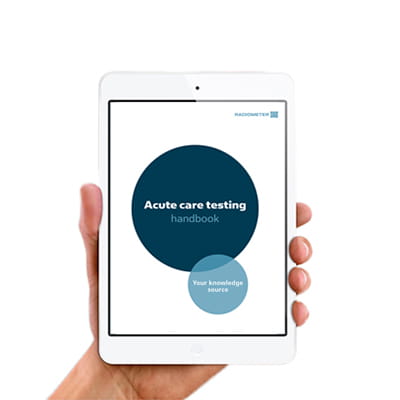Printed from acutecaretesting.org
April 2011
The importance of preoperative evaluation of NT-proBNP
BACKGROUND
Perioperative morbidity and mortality is a significant public health issue due to the impact on patient’s survival and on healthcare resource utilization.
The volume of surgery in ageing population with major comorbidities as well as the prevalence of coronary artery disease are increasing, and are heralding an era of escalating healthcare costs incurred as a result of postoperative morbidity.
The prevalence of coronary artery disease is increasing and the cardiovascular complication is a major cause of perioperative morbidity and mortality.
RISK ASSESSMENT
The preoperative evaluation of patients scheduled for non-cardiac surgery is becoming a major component of clinical cardiology. A number of clinical risk indices using scoring systems have been developed, but the predictive power is still insufficient [1,2].
Often used is the Revised Cardiac Risk Index (RCRI), which assigns one point for each of the risk factors:
- High-risk surgical procedures
- History of ischemic heart disease
- History of congestive heart failure
- History of cerebrovascular disease
- Preoperative treatment with insulin
- Preoperative serum creatinine > 2.0 mg/dL
The risk estimates for a major cardiac event (includes myocardial infarction, pulmonary edema, ventricular fibrillation, primary cardiac arrest and complete heart block) are: 0 points - 0.4 %, 1 point - 0.9 %, 2 points - 6.6 % and ≥ 3 points - 11 %.
Over the years, non-invasive tests have been expected to refine estimates of perioperative risk and improve outcomes but this is not sufficiently proved yet [3,4].
Results of non-randomized retrospective outcome studies were not consistent, suggesting both benefit and no benefit or even harm from preoperative stress test [5,6].
The benefit of preoperative stress testing was not evident again in prospective randomized trials, including one multinational study (Dutch Echocardiographic Cardiac Risk Evaluation Applying Stress Echo-II, or DECREASE-II) [7].
The role of preoperative non-invasive stress test is even more limited because of the absence of a clear benefit from preoperative revascularization in patients with significant coronary artery disease.
Morbidity or mortality could not be decreased in the revascularization arm of two randomized prospective trials (CARP, DECREASE-V) [8,9]. The lack of preoperative stress testing may be partially explained by the high perioperative risk immediately after percutaneous coronary intervention (PCI), which is a potential downstream consequence of the positive stress test results.
The risk of fatal stent thrombosis is substantial within several weeks after bare-metal stent and within one year after drug-eluting stent that requires long-term dual antiplatelet agents [10,11].
Moreover, even after non-invasive testing, the role and indication of preoperative beta-blocker for the perioperative risk reduction is also still in debate [12,13].
A POTENTIAL ROLE OF BIOMARKERS
Currently, establishing a method that estimates perioperative risk more accurately may be the best strategy to improve the perioperative care. The method should be simple, cheap, strongly predictive and non-invasive to be used in clinical practice easily.
The cause of perioperative cardiovascular disease is not yet well identified, but the pathophysiology of cardiovascular disease, including inflammation, myocardial ischemia, or increased ventricular filling pressures, would be important again in the development of perioperative cardiovascular disease.
Therefore, cardiovascular biomarkers reflecting the pathophysiology would be useful for the prediction of perioperative risk [14].
B-type natriuretic peptide (BNP) and its inactive N-terminal fragment (N-terminal-pro-B-type natriuretic peptide, NT-proBNP) are synthesized in ventricular myocytes and secreted into blood in response to atrial or ventricular wall tension or ischemia.
BNP or NT-proBNP is a validated powerful predictor of death or major cardiovascular event in patients with heart failure or coronary artery disease [15,16], and also shown as a powerful, independent predictor of perioperative event after non-cardiac surgery in observational studies [17].
In the same context, use of multiple cardiovascular biomarkers would be more accurate for the prediction of perioperative cardiovascular event [18].
We investigated prospectively the predictive power of preoperative N-terminal pro-B-type natriuretic peptide (NT-proBNP) and C-reactive protein (CRP) for the perioperative cardiovascular risk in a large prospective cohort of patients undergoing elective major non-cardiac surgery (N=2054) [19].
TABLE I. Clinical outcome
| Frequency (%) | |
| Perioperative major cardiovascular event (PMCE) | 290 (14.1) |
| Acute myocardial infarction | 102 (5.0) |
| New or aggravated heart failure | 248 (12.1) |
| Primary cardiovascular death* | 15 (0.7) |
| Death due to postoperative complication or disease progression | 5 (0.2) |
| All death | 20 (1.0) |
*Death that was not caused by postoperative complication or underlying non-cardiovascular disease progression.
These cardiovascular biomarkers were selected as representative biomarkers of hemodynamic stress and inflammation, respectively [18, 20]. NT-proBNP and CRP were better than clinically determined perioperative risk index.
In this study, the optimal cut-off values (derived from ROC curve analysis) were:
- RCRI: ≥2 for RCRI
- NT-proBNP: ≥301 ng/L
- CRP: ≥3.4 mg/L
The relative risk (RR) for each of the parameters at the cut-off value can be seen in Table II.
TABLE II. Clinical outcomes according to the risk predictors
| PMCE | ||
| RR (95 % CI) | p | |
| Per 1-SD increase | ||
| RCRI (1-SD ~ 1 to 2) | 1.26 (1.10-1.44) | 0.001 |
| CRP (1-SD ~ 2.7 mg/L to 15.1 mg/L) | 1.74 (1.55-1.95) | <0.001 |
| NT-proBNP (1-SD ~ 135 ng/L to 601 ng/L) | 2.17 (1.91-2.45) | <0.001 |
| Optimal cut-off of each risk predictors | ||
| RCRI | 1.50 (1.17-1.91) | 0.002 |
| CRP | 2.75 (2.16-3.45) | <0.001 |
| NT-proBNP | 3.89 (3.15-4.74) | <0.001 |
| Combination of best cut-off of each predictor | ||
| Two or three risk predictors ≥ cut-offs | 4.55 (3.69-5.52) | <0.001 |
Analysis was adjusted with all significant univariate risk factors, including age and sex.
Furthermore, the predictive power of the clinically determined perioperative risk index could be strengthened significantly by simple addition of these biomarkers.
Addition of CRP and NT-proBNP into RCRI increased RR significantly (4.55, 95 % CI = 3.69-5.52). Evaluation of preoperative cardiovascular biomarkers, especially NT-proBNP or CRP, may be a practical, simple and reasonable strategy to improve perioperative risk prediction strategies with minimal clinical burden and cost.
However, despite the robust and positive association between BNP or NT-proBNP and perioperative cardiovascular disease shown in observational studies, [17] there have been no randomized clinical trials demonstrating outcome benefit when used to guide perioperative management.
Now it is the prime time to establish these biomarkers as tools in the perioperative armamentarium using interventional trials.
References+ View more
References
May contain information that is not supported by performance and intended use claims of Radiometer's products. See also Legal info.
Acute care testing handbook
Get the acute care testing handbook
Your practical guide to critical parameters in acute care testing.
Download nowScientific webinars
Check out the list of webinars
Radiometer and acutecaretesting.org present free educational webinars on topics surrounding acute care testing presented by international experts.
Go to webinars









